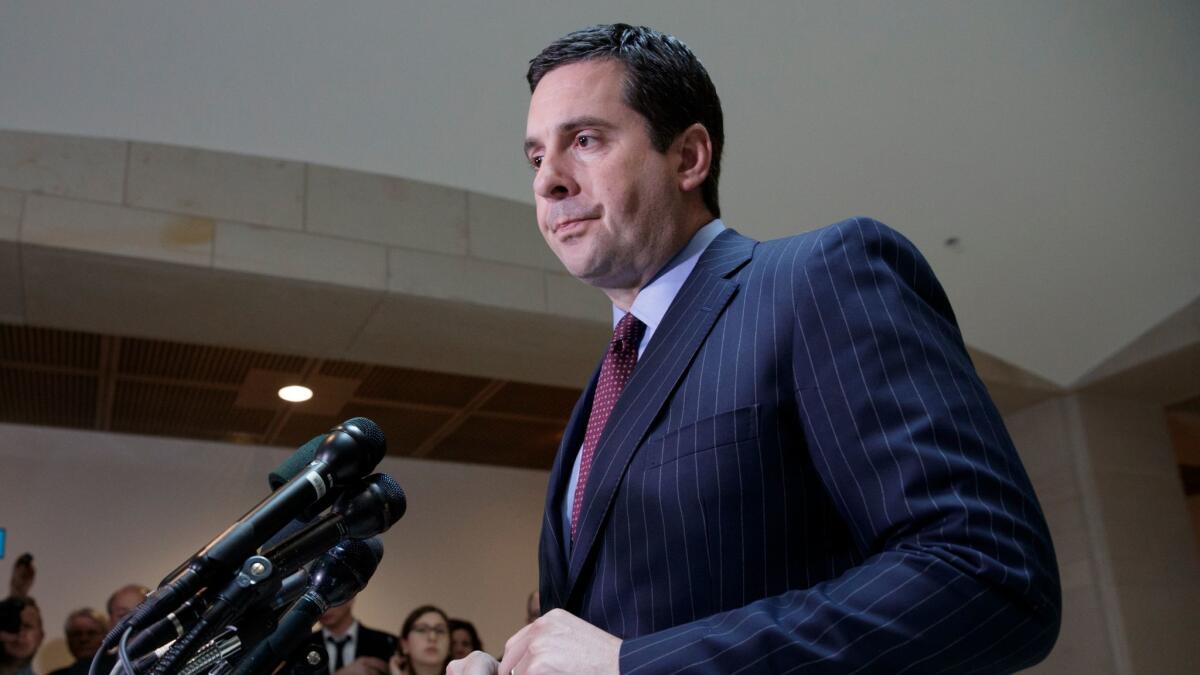Op-Ed: The Russia investigations need to avoid the mistakes of past congressional probes

- Share via
Even as the FBI conducts a “counterintelligence investigation” into possible collusion between Russia and the Trump campaign, both the House and the Senate intelligence committees are conducting their own inquiries into Russian involvement in the 2016 election. Although the Senate side appears to be functioning well, the House has stumbled, with the committee’s chairman, Rep. Devin Nunes (R-Tulare) stepping aside last week amid complaints that he is too close to the White House.
It is difficult to get politically charged congressional investigations right, especially when they touch the president. Yet the results of the inquiries will be meaningless unless the American people have confidence that they were done thoroughly and fairly.
I have worked on several such inquiries, including the Church Committee’s investigation of the intelligence community in the 1970s, the Pike Committee’s investigation of the same, and the joint congressional investigation of the Iran-Contra affair in the 1980s. Some aspects of these investigations were carried out well; others were done poorly. Here are the pitfalls of past inquiries that should be avoided at all costs.
They were media hungry
In 1975, the House Select Committee on Intelligence, chaired by Democratic Rep. Otis Pike of New York, began investigating whether the FBI and the Central Intelligence Agency were illegally spying on American citizens and whether the CIA was involved in coups abroad.
The purpose of congressional investigations is neither to impeach nor protect the president. Rather, it’s to preserve our democracy.
At one point, the committee informed the Department of State, where I was working as an attorney, that it had information indicating that Secretary of State Henry Kissinger had learned of a planned coup overseas but did not inform the head of state there because Kissinger wanted him assassinated. The committee planned to release the story the next day unless we could disprove it. The story was not true, and we stayed up all night pulling evidence together. But members of the committee who were politically opposed to Kissinger were so eager for this damaging bit of information to be real that we were barely able to convince them they were wrong.
The Pike Committee ultimately lost all its credibility when its draft report was leaked to the media. No committee chairman should want this legacy.
They were partisan
On the joint congressional investigation into the Iran-Contra affair, on whose staff I served, some Democratic members were convinced that President Reagan had knowingly violated a prohibition on arms sales to Iran and a statute limiting his ability to provide support to the Contras, who were fighting the Sandinista regime in Nicaragua. This conviction led to wistful thoughts of impeachment.
The Republicans sought to defend Reagan, resulting in much finger-pointing, bickering and an almost singular focus on the president’s role by the committee and the press, which in turn caused them to pass over other key details.
They were rushed
The Iran-Contra investigation decided to complete its work by the end of 1987 in order to keep the affair out of the presidential election of 1988. For this reason, several witnesses, including Lt. Col. Oliver North and Maj. Gen. Richard Secord, testified before the committees knew exactly what they would say. This violated a basic rule of litigation: Never ask a court witness a question to which you don’t know the answer. The wrong answer could get your client convicted.
Later, when Reagan’s national security advisor, Adm. John Poindexter, testified that Reagan had not approved crucial aspects of the affair, the committee rushed out their report without having pursued several lines of inquiry. We were not able to follow up on North’s testimony that an Iranian had offered him a million-dollar bribe, for instance. As a result, many details were lost to history.
They torpedoed subsequent prosecutions
By granting immunity to multiple witnesses, the Iran-Contra Committee impaired the Justice Department’s investigation into the scandal. For instance, over the strong objection of the Justice Department, the committee granted immunity to North and Poindexter, making prosecution so complicated that the department was ultimately forced to drop criminal charges against them.
The purpose of congressional investigations is neither to impeach nor protect the president. Rather, it’s to preserve our democracy. This can be done only if Congress is able to follow the intelligence and truly get to the bottom of Russian interference in our politics. Avoiding these past mistakes is a start.
Jeffrey H. Smith is a former general counsel of the CIA and a former general counsel of the Senate Armed Services Committee.
Follow the Opinion section on Twitter @latimesopinion or Facebook
More to Read
A cure for the common opinion
Get thought-provoking perspectives with our weekly newsletter.
You may occasionally receive promotional content from the Los Angeles Times.






